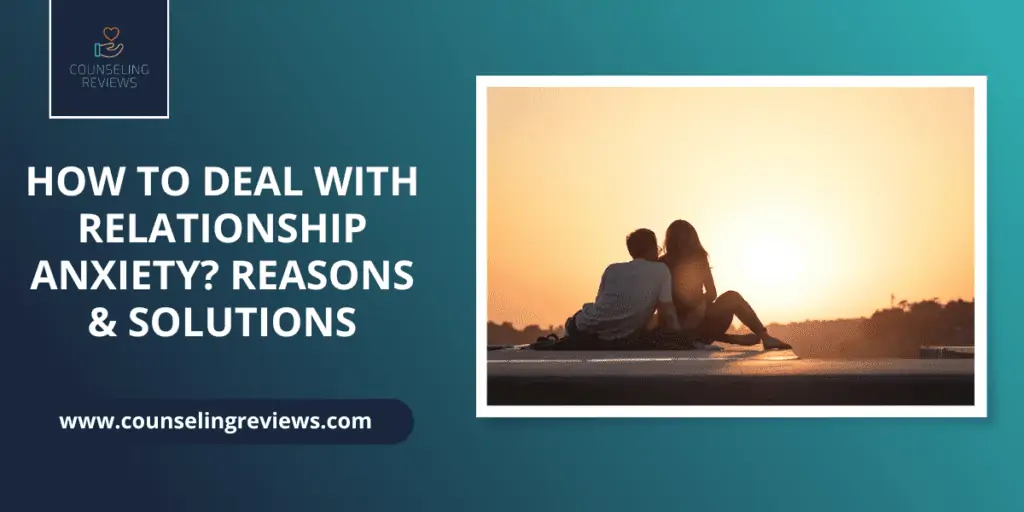As a licensed Marriage and Family Therapist, who has worked with hundreds of couples, occasional expressions of anxiety within a relationship, are not a cause for concern. From first date jitters to walking down the aisle, anxiety is part of a “normal” and healthy relationship. Anxiety becomes problematic when it begins to feel overwhelming and interferes with daily life and relationships.
Here we will explore the various symptoms of unhealthy relationship anxiety such as insecurities, clinginess, combative behavior, sacrificing self, over-analyzing, excessive worry, and fear of commitment. Later, we will look at possible solutions to treating anxiety such as working with a counselor who specializes in relationship therapy and relaxation techniques.
What is relationship anxiety?

Anxiety is “an uncomfortable feeling of nervousness or worries about something that is happening or might happen in the future.” (Anxiety, 2022) Harvard Health further defines anxiety as having three components, emotional, physiological, and cognitive. (Luana Marques, 2018)
An emotional component of anxiety is the fear you may experience when you are about to leave for a first date. The physiological expression of anxiety might include sweaty palms and a rapid heartbeat. The cognitive manifestation of anxiety could be the thought, “I hope she likes me.” This example demonstrates a relatively harmless and customary experience with anxiety.
“Anxiety was born in the very same moment as mankind. And since we will never be able to master it, we will have to learn to live with it – just as we have learned to live with storms. (Coelho, 2013)” – Paulo Coelho
Our survival is dependent on a healthy level of anxiety
Biologically, our ability to survive was designed to be somewhat dependent on anxiety. The pit in your stomach as you enter a dark forest. The alertness and hypervigilance you notice, as you scan your surroundings to assess your safety. This level of anxiety helps prepare you should you encounter a large animal. You are on alert and ready to fight or run (flight)
The trouble with too much anxiety
Experiencing frequent anxiety, regardless of the context, is not healthy for anybody. Our bodies are not meant to remain in a constant state of hypervigilance. When our bodies feel under fire from constant anxiety, negative symptoms can begin to develop such as the following.
- Fatigue
- Irritability
- Difficulty concentrating
- Sleep disturbances
- Aches and pains
Why do people experience relationship anxiety?

There may be a variety of reasons why some people experience detrimental relationship anxiety while others do not. Certain experiences with trauma can contribute to relationship anxiety. If a person experienced their parent’s divorce as traumatic and fraught with vicious arguments, that person may experience commitment anxiety. In this way, the trauma of a parent’s divorce impacts how committed one chooses to be in a relationship.
Sometimes the relationship we had with our earliest caregivers, influences how secure or anxious we feel in our current relationship. If a daughter grows up feeling abandoned by her father, she may have abandonment anxiety in her adult relationship.
Those who present with Generalized Anxiety Disorder or any other anxiety disorder, may also be more prone to relationship anxiety.
Is my relationship doomed
Whatever the cause, help, and support are available. Just because we have experienced a trauma, a difficult childhood, or live with a diagnosis, does not mean we are doomed to have relationship anxiety. Human beings are dynamic creatures with an amazing capability to overcome hardship and thrive. With support, we can learn how to become more resilient and we can learn other techniques to nurture our relationships.
Seven expressions of relationship anxiety
When we discuss relationship anxiety, we are referring to the type of anxiety that feels maladaptive and destructive. Unhealthy relationship anxiety feels unhealthy. The person experiencing the anxiety feels out of control and upset about their feelings and behaviors.
Insecurities
For those who come from challenging family backgrounds, insecurities can create a larger impact on current relationships. If you feel unattractive and this insecurity is compounded with a history of feeling unloved in your family, feeling unattractive may have a larger impact on your relationship. Perhaps you feel sexually inhibited because you don’t like being naked, or you get jealous when your partner looks at an attractive person. In this manner, your insecurities are interfering with the full enjoyment of your relationship.
“I’ve spent most of my life and most of my friendships holding my breath and hoping that when people get close enough they won’t leave, and fearing that it’s a matter of time before they figure me out and go.” – Shauna Niequist (Niequist, 2013)
Clinginess
When you spend time apart from your partner, do you feel anxious? Do you worry your partner is having more fun without you around? In response to these concerns do you overcompensate by maintaining proximity to your partner as often as possible? This determination to be physically and mentally close to your partner as often as possible is an expression of anxiety called clinginess.
Most likely, this desire to be close at all times is related to the fear of abandonment or the fear of being alone. The prospect of being abandoned can feel so overwhelmingly devastating, the person trying to prevent being abandoned will do almost anything to avoid being left.
They may believe their constant presence, can keep their partner invested in the relationship. The clingy partner may believe that if their partner is always nearby, they will have more control in the relationship. They may also believe their constant presence is a demonstration of love when in fact, it can feel like being smothered by the receiving partner.
Combative behavior and self-sabotage
When you feel as though you are always arguing, this is a problem worthy of exploration. Do you find yourself nit-picking, criticizing, or starting arguments? If so, you may be self-sabotaging your relationship. Sometimes, we self-sabotage without even knowing it, the behavior can feel almost compulsive. Other times, we are aware we are pushing our partner away but we can’t seem to stop ourselves.
Self-sabotage is related to the fear of abandonment. If we pick at our partners and test their commitment to us by pushing them away, they are placed in a position to continually have to prove their dedication to us. Their willingness to prove themselves can feel very validating.
When the receiving partner has experienced enough combative behavior, they will typically end the relationship. The one who is left behind might feel self-contempt for “pushing away” their partner. Their feelings of unworthiness may also be confirmed by their partner leaving them, creating a vicious cycle.
There also may be times when we want to end the relationship but we don’t want to be the “bad guy.” Instead, we are combative in order for our partner to end things and consequently be responsible for the termination of the relationship. This desire to end things could be related to commitment anxiety or for any other variety of reasons. Nevertheless, this passive-aggressive behavior can be indicative of anxiety, as it demonstrates the fear of communicating honestly with their partner.
Sacrificing self for others
When one person is consistently the giver in the relationship and the other person operates as the taker, this represents an unhealthy imbalance. Some people in a relationship place great emphasis on pleasing their partner, at the expense of their own needs. The giver is often giving, as an attempt to maintain their union. They may feel unworthy of love and feel as though they have to cater to another’s needs to be valued and loved in return.
“Anxiety is love’s greatest killer. It makes others feel as you might when a drowning man holds on to you. You want to save him, but you know he will strangle you with his panic.” – Anais Nin (Nin, 1944)
Constant worry
Constant worry in a relationship, however, is not healthy long-term and can place a major strain on both partners. If you find yourself worrying a lot about your partner and your relationship to the point where you actually feel “sick with worry,” this is important to resolve, as it is most likely contributing to a lot of stress for both of you.
If you keep your worries bottled in, you and your body will feel the stress of those suppressed feelings. If on the other hand, you inundate your partner with all of your worries, and they are placed in a position to have to confirm or deny each concern, this can cause a lot of friction in the relationship.
Over analyzing
Whether we analyze at work, with our kids, or with our partners, we have become accustomed to over analyze at times. Even Sigmund Freud once said, “sometimes a cigar is just a cigar.”
If you find yourself analyzing your girlfriend to the point where you feel emotionally exhausted, it may be time to address this. Typically, our motivation to analyze is to understand and to find a solution. Are you analyzing why your girlfriend said she didn’t want to go out Friday night? Are you finding yourself constantly questioning her motives?
When you over-analyze, you tend to move further away from your instinct about what is actually transpiring. Like Maya Angelou once said, “when people show you who they are, believe them the first time.” If through your analysis you are feeling more confused and less certain about your relationship, this is a sign that over-analysis may be contributing to your distress.
Commitment challenges
Perhaps you have found yourself struggling to commit to one person. Sometimes this is a healthy choice. There is no need to settle, after all, there are plenty of fish in the sea. Some people prefer to be alone. Choosing to be relationship-free, is a conscious choice and is not related to the fear of commitment.
However, if you desire a long-term connection and can’t seem to commit, you may want to explore this further to see if relationship anxiety is preventing you from forming a deep and fulfilling connection. Sometimes it’s the chase that is so appealing and once you are in a relationship, you find yourself easily bored, so you move on.
If you recognize a pattern of short-term commitments and yet you deeply desire a relationship, you may benefit from working with a therapist to learn why you are anxious to commit.
Solutions for relationship anxiety
There are many solutions to alleviating relationship anxiety. From counseling to meditation, you may find more than one option helpful in relieving your anxiety.
Therapy
It is always helpful to elicit the help of a licensed therapist when dealing with issues you have tried to solve but struggle to resolve. A therapist’s job is to listen, remain objective and offer feedback. There are many excellent therapists available online, you can start your search here at Regain.com.
Therapy is like standing outside at night and looking into a well-lit home. From the outside, you can see everything clearly happening in the home. The people inside, however, have a different view. The therapist has a clearer view of the issues because they have the advantage of distance from those problems.
Equally important, therapists are educated and have experience with many people with similar difficulties. They can help guide you to create effective solutions and coping strategies. Whether you work with a therapist individually or as a couple, working with a therapist can have a positive impact on your relationship.
Meditation
Meditation is always a helpful tool to use for everyday stressors. When we take a moment to breathe and sit in stillness, we are helping both our mind and our body. Studies of the benefits of mediation are plentiful.
“MRI scans show that after an eight-week course of mindfulness practice, the brain’s ‘fight or flight’ center, the amygdala, appears to shrink. The connection between the amygdala and the rest of the brain gets weaker, while the connections between areas associated with attention and concentration get stronger.” (Ireland, 2014)
As the more “rational” parts of the brain grow stronger with mediation, the primal fear responses become less powerful in determining our thoughts and behavior. The benefits of meditation are greatest when practiced regularly. Just as we exercise our bodies consistently to reap the benefits of building muscles, our brain too requires this type of repetitious training to reap the full benefits of meditation.
Honest Communication
If you are experiencing relationship anxiety, it can be helpful to address your concerns with your partner. Choose a time when both of you can be fully committed to the conversation and not distracted. Remember to use “I language” to demonstrate ownership of your feelings and behavior.
You may say something like, “I realize lately I can’t seem to stop worrying about our future together. I’m afraid you don’t want to be with me.” In this way, you are simply stating your truth, you are not making assumptions.
It is up to your partner at this point in the conversation, to speak their truth and either confirm or deny your fears. At the end of the conversation, you will have the information you need to determine if you need support to help alleviate your relationship anxiety.
Create Joy Outside of Your Relationship
Some of the happiest relationships are those in which each person has their own identity and interests. When we first enter into a relationship, it is not uncommon to become entangled with one another’s life, hobbies, interests, and friends. However, as time passes, and life brings its challenges, it becomes clear just how important it is to maintain some sense of autonomy.
What brings you joy? If you won the lottery, what would you be doing with your time? Discover what brings you joy outside of your relationship.
No one can meet all of our needs, it is impossible. Forget the fairytales of the “knight in shining armor” or the “perfect princess,” I’m afraid they don’t exist. A “happily ever after” won’t solve all of your problems. A balance of your interests, your friends, and your hobbies, with those of your partner, creates a happy and more balanced relationship.
Say goodbye to relationship anxiety – Conclusion
Once you identify your symptoms of anxiety and understand how they possibly manifested, it is easier to treat the issue. Whether you see a counselor for individual therapy or as a couple, relieving relationship anxiety is possible.
It is never easy to make changes. Growth requires a lot of internal work and patience. Growth is also rarely linear. Often, we take ten steps forward and then two steps back. Focus on your goals, whatever they may be, and believe in yourself, change is possible.





